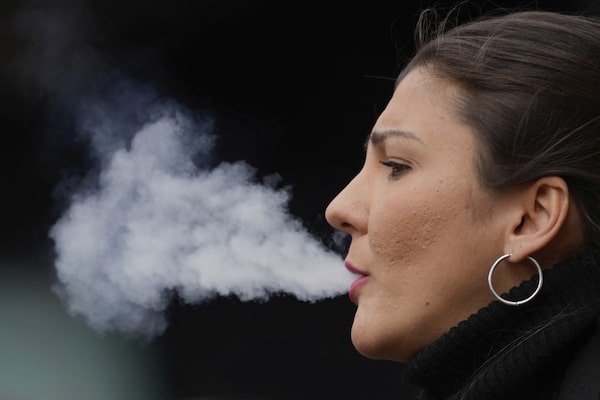
A woman smokes on a street, in London, U.K., on April 16.Kin Cheung/The Associated Press
Britain has moved a step closer to enacting some of the toughest anti-smoking measures in the world, which include banning future generations from ever buying cigarettes.
On Tuesday, MPs voted 383 to 67 to approve in principle legislation that will make it an offence to sell tobacco products to anyone born after Jan. 1, 2009. The bill also takes aim at vaping and puts new restrictions on the flavouring and packaging used in vapes, to make them less attractive to children.
The bill still has to clear more parliamentary hurdles but is widely expected to be enacted and take effect in April, 2025. Under its provisions, children turning 15 this year will be the first cohort banned for life from buying tobacco. The government estimates that once the law is in place, smoking will be phased out almost entirely in Britain by 2040.
Prime Minister Rishi Sunak has been an ardent champion of the policy, which he unveiled last October during a Conservative Party convention. “I want to build a better and brighter future for our children, so that’s why I want to stamp out smoking for good,” Mr. Sunak told party members at the time.
He took inspiration from a similar law introduced by New Zealand’s Labour government in 2022, which stopped those born after January, 2009, from being able to legally buy cigarettes. However, last fall the newly elected coalition government of the National Party and the First Party scrapped the law, which was to take effect in July. Prime Minister Chris Luxon said the ban would have created a black market and deprived the treasury of badly needed tax revenue. He has promised to introduce other measures to curb smoking.
Mr. Sunak’s government has not been dissuaded. On Tuesday, Health and Social Care Secretary Victoria Atkins pushed ahead with the legislation.
https://www.theglobeandmail.com/opinion/article-weve-won-the-war-on-smoking-except-that-we-havent/
Ms. Atkins told MPs that smoking is responsible for some 80,000 deaths annually and costs Britain’s health care system £17-billion ($29.2-billion) a year. “The truth is that there is no safe level of tobacco consumption,” she said. “It is uniquely harmful, and that is why we are taking this important action today to protect the next generation.”
The bill has won wide praise from health campaigners and scientists.
“By creating a product that is both highly addictive and deadly, the tobacco industry has caused untold misery far and wide,” said Lion Shahab, co-director of the University of London’s Tobacco and Alcohol Research Group. The new law will put Britain “at the very forefront of the fight to eradicate one of the most harmful inventions of modern times.”
Opinion polls also show there is broad public support for the ban. A survey of 3,000 people by YouGov last fall found that 62 per cent of respondents backed either a gradual ban or wanted the government to go further and introduce an immediate prohibition on smoking. A poll by Savanta taken last week found a similar level of support.
However, Mr. Sunak has faced sharp pushback from a group of Conservative MPs who argue the restrictions are an attack on personal freedoms.
Former prime minister Liz Truss said that while she is not an advocate of smoking, she fears the “health police” are preventing people from making their own decisions. The anti-smoking bill is “emblematic of the technocratic establishment in this country that wants to limit people’s freedom, and I think that is a problem,” she told the House of Commons.
Tory MP Adam Afriyie said smoking rates have been declining steadily and a ban wasn’t needed. “This is not a huge disaster that suddenly needs a radical change of policy to resolve the issue,” he told MPs. “It merely requires, in my view, an upping of the ante when it comes to enforcement and an upping of the ante when it comes to messaging.”
MPs were given a free vote on the bill, but the backlash was yet another example of the trouble Mr. Sunak is facing as party leader. The Conservatives are far behind the Labour Party in opinion polls and are bracing for a poor showing in local elections next month.
There have been rumblings of discontent among Tory MPs about Mr. Sunak’s leadership, but so far he has managed to avoid a full-scale mutiny that could lead to his ouster. Most Conservative MPs seem reluctant to replace him and head into a general election, expected later this year, with what would be the party’s fourth leader in four years.
 Paul Waldie
Paul Waldie